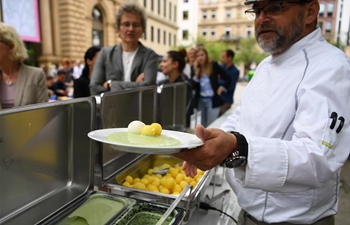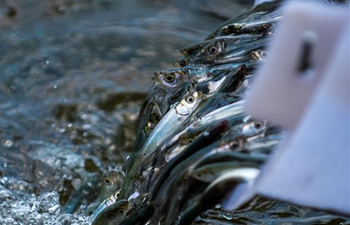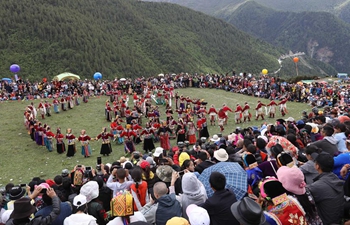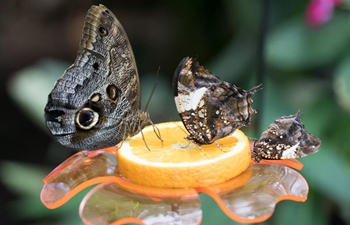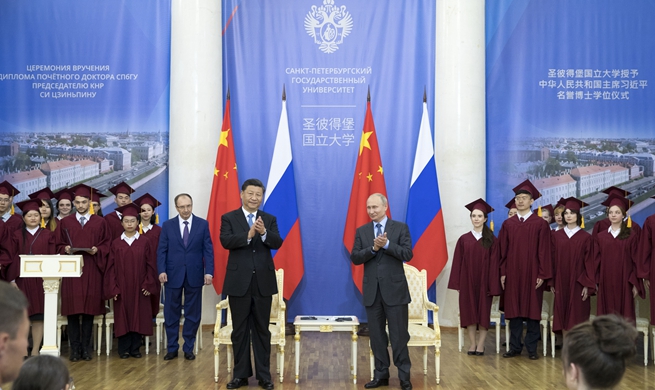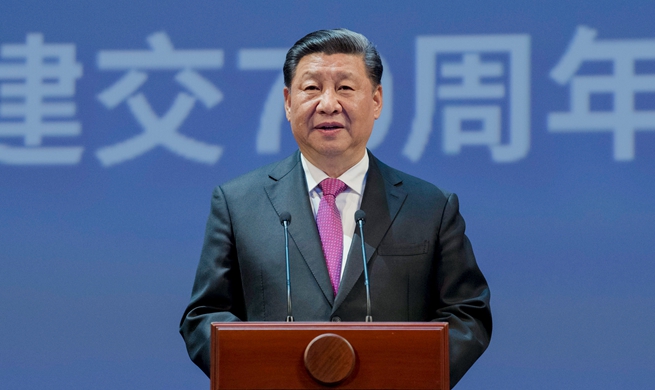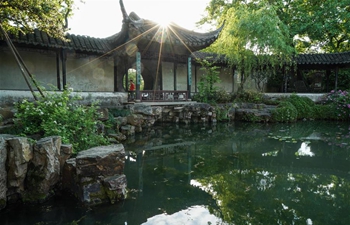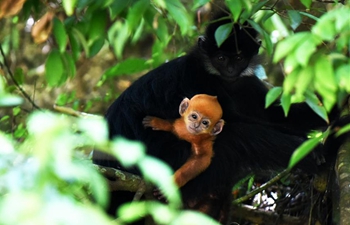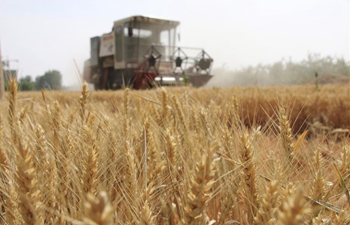by Tao Jun, Bui Long
HANOI, June 7 (Xinhua) -- On Friday morning, a family of four in Vietnam's capital Hanoi were busy eating fermented sticky rice and sour plums, the food they seldom enjoy during other days of a year.
"We're eating these food to allegedly kill worms, parasites inside our bodies," Nguyen Thanh Van, a middle-aged mother of two, smiled when saying about the key activity of "Doan ngo" (Duanwu in Chinese), Double Five or Dragon Boat Festival, which falls on the fifth day of the fifth lunar month (on June 7, 2019).
Vietnamese culture researcher Trinh Sinh said local people in the olden days strongly believed that the fifth lunar month was a time of transition from spring to summer, traditionally a time when insects and diseases developed vigorously, affecting plants, domestic animals and humans.
With that strong belief, people organized insect-killing activities outdoor, and ate certain kinds of food to kill worms in their bodies. Many people in rural or mountainous areas also went to the field or the forest to collect medicinal plants such as mugwort and oriental motherwort to make herbal medicines for treating common diseases.
This traditional custom has been practiced for ages, first among peasants, then in other social classes, the researcher said.
In the past, many peasants believed that fermented sticky rice could make worms in their bodies become tipsy and gradually die. To make the worms die quickly, they often ate sour fruits such as plum and wampee (Clausena lansium) after enjoying fermented sticky rice.
Nowadays, thanks to advanced farming techniques and introduction of strong pesticides and evidence-based medicines, local people no longer have to manually catch insects or eat something to kill worms. However, they still maintain their age-old custom of eating certain kinds of food, hoping for good health and bumper crops.
The foods are different in different regions of Vietnam, with fermented sticky rice being the most popular in the north, and "banh u" or "banh tro" or "banh gio," sticky rice treats wrapped in bamboo leaves, similar to the Chinese food of zongzi, being the most popular in the south.
"I went to the market early this morning to buy one kg of fermented purple sticky rice at a price of 90,000 Vietnamese dong (3.9 U.S. dollars) and one kg of plum at a price of 45,000 Vietnamese dong (1.9 U.S. dollars) for my family of four people," bank clerk Nguyen Thanh Van told Xinhua on Friday, noting that the prices were a little bit higher than ordinary days.
Many fermented sticky rice sellers in different markets in Hanoi said each of them sold 50 kg to 300 kg of the food on Monday. Some local people advertise their fermented sticky rice on social networks such as Zalo and Facebook and receive orders online at selling prices similar to the products on sales at traditional markets.
In Ho Chi Minh City, a 100-meter alley of Pham The Hien Road, District 8 accommodates nearly 20 households specialized in making "banh u" from glutinous rice, grounded green bean and sugar.
"Banh u" made in the alley is most well-known in Ho Chi Minh City. Its prices range from 60,000-80,000 Vietnamese dong (2.6-3.5 U.S. dollars) per dozen.
"Traditionally, the cake's filling is grounded green bean, but this year we have additionally made the filling from durian or pumpkin," the alley's resident Tran Thanh Loan told Xinhua on Friday.
She said "banh u" sells well for only two or three days during the festival, but the food-making occupation has helped three generations of her family make ends meet for the past 50 years.
During the festival, while Vietnamese people prefer enjoying "banh u" and fermented sticky rice and sour fruits, Chinese people often eat Zongzi and race dragon boats.
While most of Vietnamese people assume that the festival originates from agriculture-related activities in the olden days, many Chinese people believe that the festival commemorates the death of Chinese poet and politician Qu Yuan of the ancient state of Chu during the Warring States period. He has been known for his patriotism and contributions to classical poetry and verses.
"It's interesting to know that Doan ngo (Duanwu) Festival is closely related to Qu Yuan from China. When I was a grade student, our literature textbook included Li Sao (The Sorrow of Parting), one of his most famous poems," the Vietnamese bank clerk said excitedly, adding that culture similarities and exchanges bring people of the two countries closer to each other.
